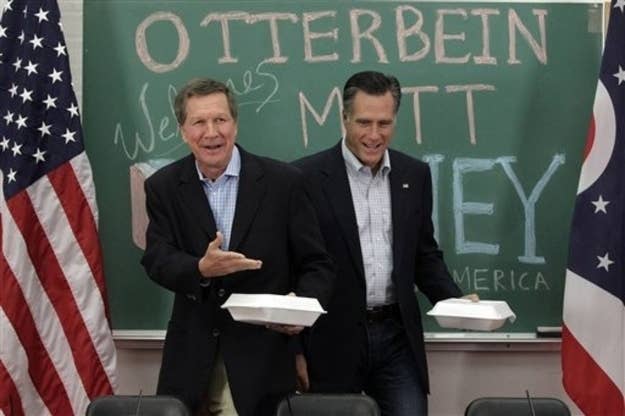
COLUMBUS, Ohio — Peace has broken out in among Ohio’s fractious Republicans, and just in time for Mitt Romney, whose allies in Washington had grown alarmed about a Hatfield-and-McCoy-style blood feud that overtook the state’s Republican Party nearly two years ago.
The replacement in early April of Chairman Kevin DeWine with a handpicked ally of Governor John Kasich — DeWine’s nemesis — will put an end to a complex fight that had already cost Romney one major public embarrassment, and which threatened to cripple the party in a crucial state. Now Kasich appears to be in full control of his apparatus, and Republicans at the state and national level are making up for lost time.
“We have some catching up to do, but we’re doing that,” said Bob Bennett, the Kasich party stalwart who took over as state chairman last month.
Ohio was the laboratory for Karl Rove’s famous 72-hour program, and has long been a focus of the party’s increasingly sophisticated organizing efforts. And this year is, Bennett told BuzzFeed, expected to be decided on the ground. “This is more 2004 [than] 2008,” he said.
But with the summer approaching, Republicans had begun to worry that the feud would overtake the nuts-and-bolts voter registration and field organizing that’s long been key to presidential politics.
“There’s no question people were getting nervous as we headed into early spring without a resolution,” said Doug Priesse, Chairman of the Franklin County Republican Party Executive Committee and a Kasich ally. “It probably put us about 30 days behind schedule in implementing our victory plan, but I don’t think we’re behind anymore.”
The split between Kasich and DeWine began with DeWine refusing to step aside in 2010 at the request of the newly-elected governor. It was resolved in an unusual set of expensive, contested elections for state committee seats this spring, when Kasich took control of the party and forced DeWine out of his spacious office on South Fifth Street in Columbus.
But it had been on full, and damaging, display in the run-up to the March 6th Super Tuesday primary, and Romney spent his time in the state walking on eggshells, aides said, wary of upsetting or showing favoritism to either political leader.
Occasionally Romney inadvertently did step in it. In October, the candidate visited a state party phone bank opposing the repeal of SB 5, the Kasich-backed law limiting collective bargaining rights of state employees. Romney surprised observers by refusing to take a position on the bill himself. The following day, after an outcry from conservatives and Kasich loyalists, Romney backed expressed his support for the bill. It was an episode the Romney campaign was unwilling to repeat. Before the March 6th primary, staffers were briefed on the internal party drama, and instructed to keep Romney out of it.
“I don’t know if any of the conspiracies ever took place, but what it was demonstrative of in part was that you really want your state party and senior elected officials to be on the same page,” Priesse told BuzzFeed. “Now we do.”
The Romney campaign, meanwhile, is relieved the furor is in the past.
“He wants the party so he can start his reelection campaign now, because he won’t have enough time to get his numbers up if he starts in December,” said one top Ohio Republican. “The Romney folks don’t mind, they’re just happy it’s over.”
And on the ground in Ohio, party operatives and loyalists have begun to regroup. Kasich-loyalists have already replaced many of the DeWine hires at state party headquarters, but top former DeWine aides have moved to positions at the RNC or the Romney campaign for the general election. The Romney campaign hired former Ohio GOP Communication Director Chris Maloney to run communications in the state and former state party Executive Director Darren Bearson was tapped to be the Republican National Committee’s Regional Political director for Ohio and Pennsylvania last week.
“I lost some people that I didn’t want to lose,” said Bennett, “but I’m grateful that they’re staying here in other roles.”
The spirit of letting bygones be bygones extends to the bitter primary fight between Romney and Rick Santorum in the state, which Romney won by just 10,288 votes. Santorum won a handful of districts in which he did not file complete delegate slates, which the Romney campaign challenged when the primary was close. The Romney campaign has withdrawn those challenges, allowing the Santorum statewide team — including Romney turncoat Attorney General Mike DeWine (a cousin of the former chairman) — to select those delegates to the Republican National Convention.
DeWine, state party leaders say, has pledged to select delegates who will back Romney at the convention.
For Ohio Republicans, meanwhile, the challenge is turning to from an intra-party struggle to convincing voters that while the state’s economy is improving, it’s to the credit of their GOP governor, and not the president.
“We can point to real changes,” Preisse, said, “I think it’s hard for the president to point to specifics. That’s going to be part of the narrative. It’s maybe an extra sentence that has to be added, to convincing people to vote for Romney though.”
The state party has also begun to focus on November, opening 5 victory centers in the state, with more expected to open in the coming weeks. But the Obama campaign has more than a dozen field offices in the state.
“ It’s going to have hand to hand combat for us to win here,” Bennett said. But he expressed confidence that Republicans will be able to hold their own.
“Don’t make any mistake, we’re now primed and ready to take this race to Barack Obama, Bennett said. “We know how to run grassroots campaigns in Ohio.”
